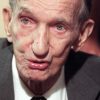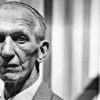The Volunteer: One Man, an Underground Army, and the Secret Mission to Destroy Auschwitz

Reviewed by Andrew Ładak
The story of Witold Pilecki, a World War II Polish Army officer who allowed himself to be arrested by the Germans and incarcerated in the Auschwitz concentration camp, is familiar to many Poles, but it’s largely unknown outside Polish circles (and limited ones, at that). I knew that in 1939 Pilecki, a young cavalry officer, fought against Hitler’s invading armies. After Poland succumbed to the overwhelming power of Germany and its Soviet ally, he joined the Polish resistance and, early in the German occupation, undertook an incredibly difficult and dangerous mission: to gather intelligence about a new German concentration camp called Auschwitz and to organize a mass escape by the inmates (then mostly Polish). The mission required Pilecki to orchestrate his own arrest and incarceration in Auschwitz. I knew that Pilecki managed to relay crucial and alarming information to the resistance about what the Germans were doing in Auschwitz, that he eventually escaped (having failed to organize a mass escape), fought in the Warsaw Uprising and, after the war, was arrested and executed by Poland’s Soviet-controlled Communist regime.
But everything I knew only added up to a brief outline of the full story. Every time I read or heard about Pilecki I realized how little I knew about the important and undoubtedly fascinating details of his story. I wondered, for example, how he found himself in a position to undertake such a dangerous and, I suspect, unprecedented mission. Other questions nagged me: Who conceived the mission and why? What motivated Pilecki and were his actions purely voluntary? How, exactly, did he “arrange” his arrest? Once in Auschwitz, what were his initial experiences and how did he deal with the camp’s brutality? How many other inmates did he enlist in his operation? How was the information sought by the resistance gathered and smuggled out of the camp, whom did it reach, and what were the results? How long was Pilecki in Auschwitz and how did he escape?
Those questions, and many others, are answered in ““The Volunteer: One Man, an Underground Army, and the Secret Mission to Destroy Auschwitz,” a new book by Jack Fairweather, a British journalist whose coverage of the war in Iraq earned him the British equivalent of the Pulitzer Prize. He also covered the war in Afghanistan for the Washington Post. It’s not surprising, then, that Fairweather’s well-researched and well-sourced account rings authentic.
In “The Volunteer,” parts of which read like a spy thriller, we learn that after his arrest Pilecki spent nearly three years in Auschwitz and that during that time, working with carefully recruited inmates under the noses of the Germans and the brutal “kapos” (mostly German criminals) who guarded the inmates, he developed an efficient resistance and intelligence-gathering organization within the camp that, at its peak, consisted of several hundred inmates. Through Pilecki’s eyes we observe as Auschwitz, initially a comparatively small, “conventional” concentration camp primarily intended to hold Poles, is quickly expanded into an extensive system of death camps and work camps. The summer of 1941 brought a massive influx of Soviet soldiers captured in the early phase of Germany’s attack against its former ally. Most were killed shortly after their arrival. The rest were starved and worked to death more gradually. At the same time, Auschwitz and several new satellite camps—notably, one at Birkenau (Brzezinka in Polish)—were transformed into death camps for hundreds of thousands of Jews, initially from within Poland, then from all over German-occupied Europe. We watch with Pilecki and his fellow conspirators as Himmler’s murderous henchmen begin implementing Hitler’s “final solution,” shooting or gassing trainloads of Jews—men, women and children—then burning their bodies in efficient, specially constructed crematoria. It was about this “killing on an industrial scale,” as it’s been described, that Pilecki tried desperately to warn the world—unfortunately, to little effect.
Drawing on extensive research and documentation, including Pilecki’s own words, Fairweather describes conditions within the Auschwitz-Birkenau system of camps and the dangerous but ingenious efforts of Pilecki’s clandestine organization to inform the West, especially British and American leaders, about the camp’s emerging and central role in the Holocaust. The author provides the political and strategic context essential to understand Pilecki’s mission by shifting his perspective frequently between Auschwitz, occupied Warsaw (where the Polish underground was headquartered and where Pilecki later fought in the Uprising), London (where the Polish government-in-exile was based) and Washington, D.C. Fairweather’s account ends in Warsaw with Pilecki’s execution.
The significance of Fairweather’s book lies partly in the fact that it’s written by an “outsider,” not by a Pole. In my experience, many Polish authors writing about World War II find it difficult, if not impossible, to avoid the influence of their own biases, which are particularly obvious among Poles motivated by ideological or nationalistic/religious fervor. By contrast, non-Polish writers like Fairweather are better able, and more willing, to avoid one-sided interpretations (not to mention the distortions and omissions, unintentional or deliberate) that sometimes characterize Polish versions of history. It’s not surprising, for example, that Fairweather refers in several places to Polish anti-Semitism before and during the war, and to the related phenomenon of right-wing nationalism and its focus on Christian identity. He’s not judgmental and doesn’t dwell on these facts, but clearly he felt—correctly—that omitting them would be dishonest and a disservice to Pilecki’s memory.
The book’s epilogue neatly sums up Pilecki’s motivations and explains why his story deserves to be told—and why it’s relevant today. Fairweather writes: “[Witold’s] story is essential for our understanding of how Auschwitz came into being and obliges us to confront how we respond to evil in our own time. Witold entered Auschwitz before the Germans understood what the camp would become…. At times he struggled to make sense of events…. But Witold, unlike most prisoners or the long chain of people who handled his reports between Warsaw and London, refused to look away…. He engaged, and in doing so felt compelled to risk his life and act.”
Fairweather doesn’t romanticize Pilecki or try to paint him as purely heroic—a hero, yes, but, like all heroes, a flawed one. We see that Pilecki was beset by doubts and uncertainties, by disappointment, disillusionment and failures. As he himself admits, he was affected by his biases and emotional limitations. Again from the epilogue: “It’s important to observe that there were limits to how far Witold’s empathy could reach. Witold never came to see the Holocaust as the defining act of World War II or the suffering of Jews as a symbol of humanity. He never let go of his Polishness or his sense of national struggle. At times in his 1945 report he is brutally frank about the difficulty he felt in identifying with the gassing of Jews, as his focus was on survival of his country, his men, himself.”
Fairweather continues: “Patriotism of this strength can seem outdated or worrisomely like the preserve of a far right rising on a tide of nationalism. But we must also reckon with the fact that Witold’s patriotism furnished him with a sense of service and a moral compass that sustained his mission in the camp. Above all, he asks us to trust one another. Witold’s defining quality was his ability to place his faith in other people.”
Fairweather ends with this: “Witold died knowing that he had failed to deliver his message. My hope is that this book will help us hear him.”








